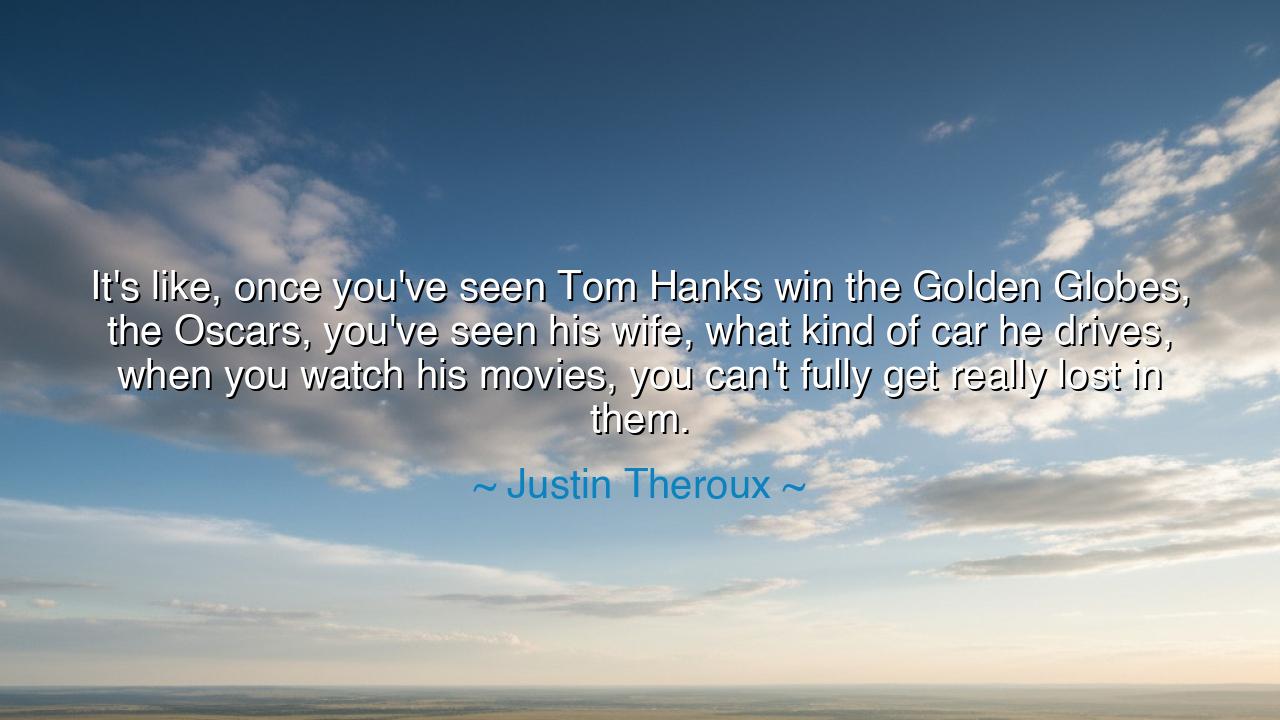
It's like, once you've seen Tom Hanks win the Golden Globes, the
It's like, once you've seen Tom Hanks win the Golden Globes, the Oscars, you've seen his wife, what kind of car he drives, when you watch his movies, you can't fully get really lost in them.






Hear now, O seekers of wisdom, for in the words of Justin Theroux lies a reflection on the nature of celebrity, authenticity, and the disconnection that arises when the personal life of an artist becomes too exposed. He spoke thus: "It's like, once you've seen Tom Hanks win the Golden Globes, the Oscars, you've seen his wife, what kind of car he drives, when you watch his movies, you can't fully get really lost in them." In these words, Theroux speaks to the paradox of modern fame—how the humanization of a person, once elevated to iconic status, can sometimes make it difficult for the audience to lose themselves in the character they are portraying. The more we know about the personal life of an actor, the more we see them as a person, and the harder it becomes to forget the real-world context in which they exist.
In the ancient world, the actors and storytellers were revered not for their personal lives, but for the characters they embodied. Consider the Greek tragedies, where actors would wear masks to not only hide their identity but to fully become the roles they played. The mask, a symbol of transformation, allowed the audience to forget the person behind the performance and focus on the universal truths being conveyed through the character. Theroux’s words, in essence, reflect this ancient wisdom: the more we know about the actor as a person, the harder it is to engage with the art itself, for we are bound by the knowledge of who they are in real life. The actor becomes, in a sense, a reflection of the world, not just a conduit for the story.
Think also of the great playwright Sophocles, whose characters like Oedipus were not merely reflections of actors, but representations of the human soul—universal in their struggles. The Greek theater did not concern itself with the personal lives of the performers. The audience did not look at the actor as a celebrity but as a medium for the ideas and emotions that transcended the actor’s identity. In the same way, an audience in modern times, when presented with an actor like Tom Hanks, must confront the difficulty of separating the person from the character. The more the actor’s public persona is known, the less they can serve as a pure vessel for the story being told. Theroux’s words point to this challenge, as the personal and public realms of the actor become intertwined, complicating the audience’s ability to fully lose themselves in the performance.
Consider the tale of the ancient Roman Emperor Nero, who was both a ruler and an actor in his own right. Nero’s performances on the stage were widely regarded with skepticism because the people could not separate the actor from the emperor. They saw his lavish lifestyle, his indulgence in wealth and power, and found it impossible to view his performances with the same innocence as they might have viewed an actor in ancient Greece. Just as Nero’s life as an emperor detracted from the authenticity of his performance, so too does the fame of modern actors—when we know too much about their personal lives, the performance becomes tainted by the reality of who they are off-screen. Theroux’s insight is a reflection of this eternal tension between the actor as a vessel of storytelling and the public’s knowledge of the person they are.
Now, let us reflect on the wisdom of the Stoics, who taught that virtue and character should not be defined by external circumstances or fame. Epictetus, the great Stoic philosopher, emphasized the importance of internal mastery, of focusing on the quality of one’s character rather than the recognition one receives. When an actor’s personal life becomes more prominent than their art, they risk becoming a symbol of fame rather than a conduit for the story. Theroux’s words challenge us to consider the authenticity of the actor—when too much of their life is exposed, it becomes difficult to separate them from the role they are playing. The audience's ability to connect deeply with the story is compromised, as they are constantly reminded of the real person behind the character.
The lesson here, O children of the future, is clear: Do not be consumed by the external world, by the fame or public image that surrounds the artist. Whether you are a creator or a consumer of art, remember that the power of storytelling lies in the character, not the person behind the mask. Just as Sophocles and Homer created works that transcended the identities of the performers, so too must we learn to separate the artist from their persona, allowing the story to guide us without the interference of external knowledge. In this way, you will be able to experience art in its purest form, free from the distractions of fame, and immerse yourself fully in the universal truths that it carries.
So, young ones, take this wisdom to heart: Do not be distracted by the fame or persona of the artist, but seek the meaning and truth in their work. Whether you are an artist yourself or a consumer of art, understand that the true power of creation lies in its ability to transcend the individual and touch the universal. Allow the story to move you, and leave behind the distractions of the world that seek to pull you away from the essence of the art itself. In this, you will find the true joy of creation and consumption, one that is not clouded by the shadows of fame but illuminated by the light of the story and the truth it carries.






AAdministratorAdministrator
Welcome, honored guests. Please leave a comment, we will respond soon